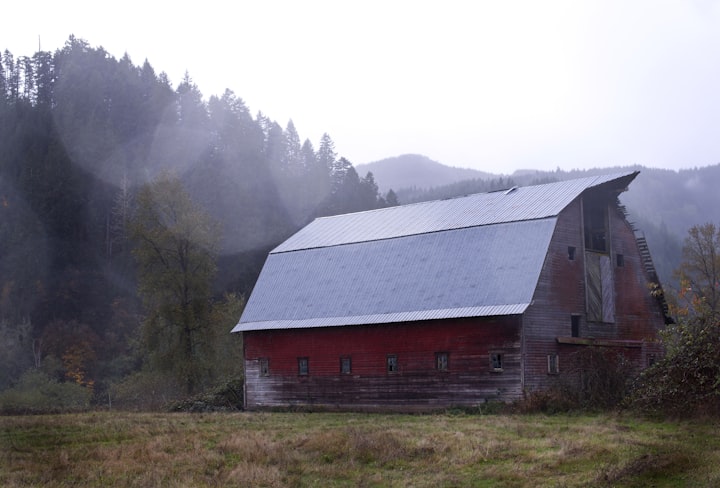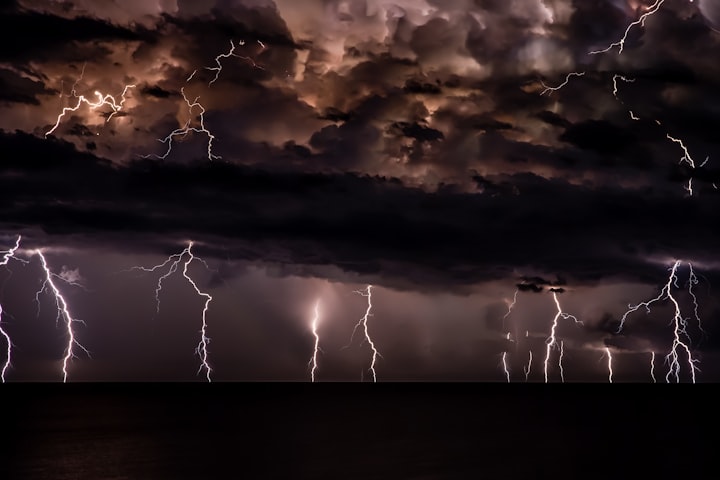The Inheritance
Strings attached

My father had been missing for 10 years before we went ahead and held a funeral. I was 9 when he moved to Echo Hill Farm for good and left me in my grandparents' care, so I’d be lying if I said I mourned him in any real sense. Other than the occasional birthday card and his annual appearance at Christmas dinner, the two of us hadn’t had much contact over the years. Even at Christmas we had never indulged in prolonged conversations. His last words to me were, “Can you pass the cream, sweetheart?” Much as I’d like to attach some deep meaning to that question, there’s not a lot to work with.
The ceremony was a small, awkward affair and I could tell my grandparents were at a loss as to how to act. For one thing they weren’t even his parents, they were my mom’s. There had never been any of the usual in-law animosity between them and I’m sure they didn’t blame him for my mom’s death. I don’t even think they blamed him for ditching his job and taking off for the middle of nowhere. My mom had been dead four years by then and it had been too much for him. They got that. It had been too much for them, too.
They never said it but I’m pretty sure my grandparents waited until I graduated to hold the ceremony, as if seeing an empty coffin lowered into the ground might prevent me from earning my degree. Up until the day they both died, I loved them dearly. They never understood me though. Just because I looked like mother—with her blue eyes and straight brown hair—didn’t mean I resembled her on the inside. In fact, she was everything I wasn’t. She’d been gifted, temperamental, driven in the frenetic way of a true musician. And sad. I don’t remember much about her but I recall the seductive melancholy of the songs she used to play on her violin before she killed herself.
I am. . .balanced. Or, as my grandmother used to say, “even-keeled.” She always said it with a little shake of her head, usually followed by a throwaway remark about God working in mysterious ways. Because my father hadn’t been any more neurotypical than my mother, though they’d been opposites in other ways.
Before he’d been one of the nation’s top physicists, an expert on string theory and an associate professor at Harvard. And my dad. I don’t have a lot of memories of those early years but I have an image of him standing in a doorway, his bulging leather briefcase slung over his shoulder, his wild hair backlit by blue sky. He’d seemed about 10 feet tall—monster tall—and my mom stopped practicing to smother him with kisses.
After he hadn’t been anything, just a guy who did odd jobs and lived in the Maine backwoods. It might be fashionable to go off-grid now but it wasn’t when he left. “So is your father like a Ted Kaczynski type figure? Bobby Johnson asked me one day in social studies class.
That night I asked my grandmother if my dad was an eco-terrorist. “No,” she said. “Not even a little.”
Despite her denial, my dad and Ted had a lot in common. They both had rejected society and chosen to live in the most primitive way possible. Echo Hill Farm had belonged my great grandfather then to my mother’s father but somehow it was my dad who ended up living there, in a ramshackle colonial that had no power and relied on well water. I told Bobby and the other kids at school the place had a big red barn, as if the presence of a barn would banish any similarity to Kaczynski and his Montana shack.
Then my father disappeared. I was 11 by then and when he came home that year for Christmas, he seemed keyed up, weirdly happy. I hoped he’d stay an extra day but he was packed and ready to go minutes after he finished his apple pie. Without a word, he hugged me and headed out. My grandmother mumbled something about a storm coming and I didn’t argue.
We never saw him again.
Last month my grandparents' lawyer informed me I owned the farm. I knew I should put it on the market but my grandparents’ deaths left me more than well off. They'd recently sold their Cambridge house and moved to Florida, where they promptly crossed paths with a drunk driver. I tried not to think of the accident and didn’t feel great about my new status as a rich woman. I’d forgotten all about the place in Maine.
I’d just ended a relationship and that left me essentially homeless. Why not hole up where my grandfather and mother had spent their summers for a couple months? I’d never been much for social media and most of my friends had ghosted me when I broke off the relationship. Then there was the not-so-small matter of me not being able to find a job.
Still, something held me back.
In the end I decided to make the move. I majored in literature and always wanted to give the great American novel a shot. Living off-grid would give me the peace I needed to finally get some writing done. Right.
As I turned my Subaru onto the dusty road that led to Echo Hill, the radio went to static. My phone hadn’t had a signal for an hour and it was already late afternoon. I wanted to arrive before sundown so I could take a look around the place and get the generator set up. I’d been there once as a kid but didn’t remember much, just that I seemed always to be alone. Who leaves a five-year-old to fend for herself for a week? But even my uber-responsible grandparents were never around while we were there.
The place looked worse than I expected. The house was a mess of chipped paint and dirty windows set in a riotously overgrown yard. The once-red barn had lost its color and its roof sagged wretchedly. Even in the late golden light, the place seemed tired and unwelcoming.
What had I been thinking?
I parked the car and got out. “Hello?” I called, though I knew no one would answer. The silence settled over me as I climbed the front steps and tried the door. It wasn’t locked.
My grandfather drove up to the farm every Memorial Day after my dad went AWOL. The police searched the place at the time, but nobody had lived there since. My dad's SUV had been in the driveway so everybody seemed satisfied that he had met with some natural disaster. It had been a cold winter, even for Maine. He'd probably wandered off and gotten lost. End of story.
After my grandfather got back to Cambridge, I always asked if he was going to sell the place but he always said no. When I asked why not, he pressed his lips together.
“It’s complicated,” he said.
Maybe he was right. The house wouldn’t be bad if I put some money into it. As I roamed from room to room, I spotted signs of my dad’s presence. A cup in a dishrack next to the sink. A stack of wood beside an ancient stove. A sweater I vaguely recognized draped over the back of a chair.
The upstairs was just as bad, just as beautiful in a time-worn way. From the upstairs window in the study, I saw nothing but fields and forest. Books rose in uneven towers and others lay open across the wide-plank floor. Papers filled with equations covered the desk. I lifted one and blew away the dust that covered it. My father’s writing curved in indecipherable loops across the page. I picked up a notebook, hoping for words I could understand, and saw that it was a schedule of sorts. There were dates and times next to his scrawled words. “Try Lorenztian frame” followed by “abject failure” and “another disappointment.” At 5:57 on December 24, 2011 he’d written a single word: “Finally.”
I dropped the notebook onto the desk. Had my father killed himself too? Was that the meaning of the last entry? I was backing away when a flash of motion caught my eye. Outside, something was making its way toward the barn.
A cat. A very orange, very large coon cat.
The cat was far ahead of me when I emerged from the house. I shot after it as it slipped into the shadows at the edge of the yard. Why I was chasing an enormous, probably feral animal into the woods I did not know. The sun was setting and a red glow shone through the shaggy pines. I ran with my hand pressed to my side as I stumbled over roots and stones. The forest opened before me as I lunged after the fading bright fur.
I was panting hard when I heard it. Bach’s Violin Partita No 2. in D Minor. It had been my mother’s favorite piece and the notes enveloped me. Meanwhile, Catzilla was nowhere to be found. As I hurried deeper into the forest the music grew stronger, steadier, more clear and pure than seemed possible.
The cave lay hidden in the side of a steep hill, its mouth dark and melodious. I wanted to enter but stood motionless, trying to make sense of what I was hearing. I felt for my phone but realized I’d left it behind. How stupid would I be to go in there without a flashlight?
I heard something else. Laughter.
I took a breath. Stepped inside.
There was no light but, oh, God, was there sound. An uncertain concerto, a girl’s stifled giggle as she botched the notes. A fast, fiery melody accompanied by slow, deliberate claps. My grandfather’s voice, only less scratchy, ordering someone to “Be back in time for supper.” My grandmother stating matter-of-factly, “There's some calamine lotion in the medicine cabinet.”
Waves of the past washed over me, scarring and soothing me in a way the present never had. It hurt horribly—exquisitely.
I took another step deeper into the echoes and my foot struck something hard. I knelt and lay my hand over it. A skull. I knew it was my father's even before I found the wedding ring. The ring felt cool in my palm, elegant and oddly heavy. I edged away from the skull and the bones scattered around it. My eyes stung as the music stopped and my father’s voice filled the emptiness.
He wasn’t talking to anyone, only reciting numbers and letters, whispering them over and over like a prayer. Then: “I’m coming to you.” Then: “I love you.” Finally: “Please.”
I leaned against the cave wall. “Daddy?” I called in a voice I hadn’t used since I was 9. “Daddy, can you hear me?”
He couldn’t, of course. Just like my mother hadn’t heard him calling to her. It was a place of echoes, not ghosts. His equation hadn’t worked but the air still held his desperation, his infinite failures. Numbers and notes rose to a crescendo before dipping to a warm hum.
I laid the ring onto the cave floor. A perfect circle. Bach's partita started up again. I sank to the ground.
The cat was outside when I emerged. I don’t know how long I was in there—minutes, hours—only that the Maine Coon stood before me, its fur a flame in the night. I followed it to my car and when I opened the passenger door, it scrambled onto the bucket seat. I took a long last look at the farm before I turned and headed back down the dirt road. The stars above shone with the mad, spangled brightness of all lonely, brilliant places. I didn’t know where we were headed, only that we were moving forward.
About the Creator
Lori Lamothe
Poet, Writer, Mom. Owner of two rescue huskies. Former baker who writes on books, true crime, culture and fiction.






Comments
There are no comments for this story
Be the first to respond and start the conversation.